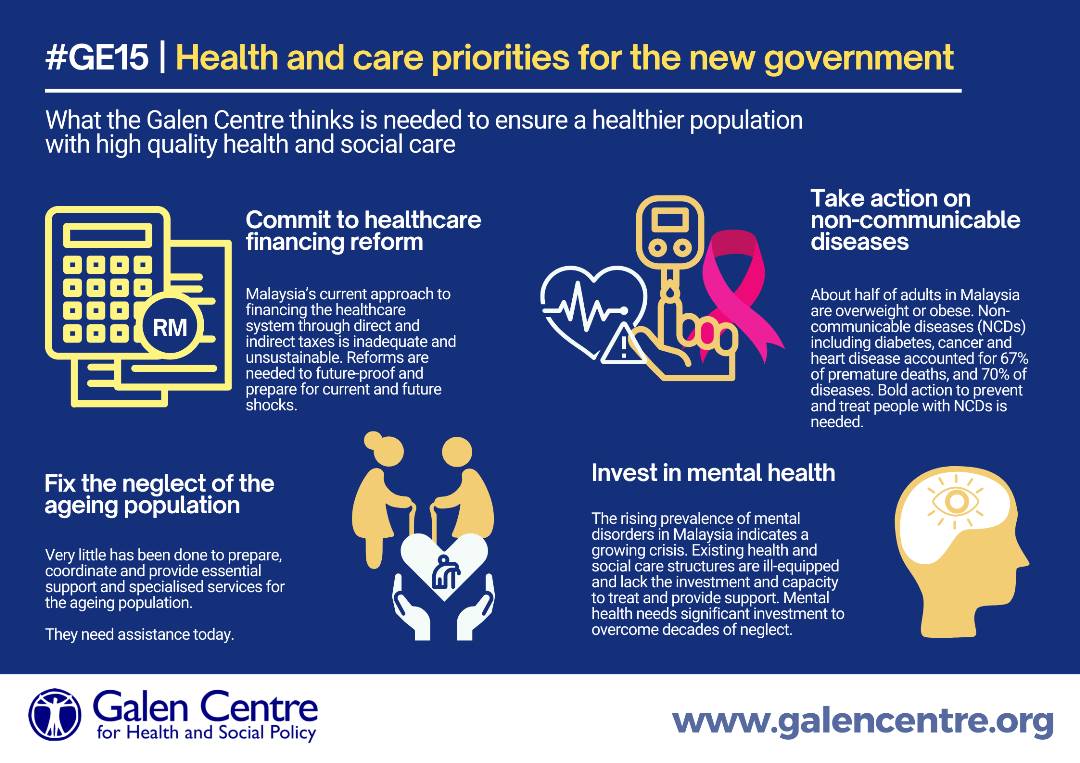As the country continues to gain from improvements in life expectancy and a growing modern economy, demand and needs for high quality health and social care have also steadily increased.
Unfortunately, health inequalities have also grown. Malaysia’s two-tier framework of public and private health care systems, often used as an example of how complementing services can successfully work alongside, is now seeing divides, gaps, and disparities in access, timeliness, quality, coverage, and sustainability of treatment and care.
Before the start of the Covid-19 pandemic in 2020, the view was that Malaysia was already experiencing multiple crises: swathes of the population living with multiple non-communicable diseases (NCDs) such as diabetes, hypertension, cancer, and cardiovascular disease, and a lack of concern and support for an increasing ageing population.
The pandemic underlined the consequences of underinvestment, overdependency, and disparities contained within Malaysia’s health and care system.
Health is more than just the activities, budget, and expenditure of the Ministry of Health (MOH). Today, health happens everywhere. It happens in the homes of patients, communities, in the food stalls, in the malls and offices.
Health is not, and has never been, confined to a clinic or hospital. If the system is to transition from being focused on “sick care”, health care must be distributed. Care must be delivered where and when health happens, in the context, places, locations, and within issues and concerns relevant to patients.
Malaysia must look to distributed models of care, moving beyond dependence on centralized facilities such as hospitals, and bringing care closer to patients to their communities and homes.
It needs to invest in building and strengthening institutional and community capacity, to ensure sustainability and futureproofing against growing challenges, current and emerging threats (e.g. another pandemic) and to guard against anyone being left behind.
Any aspiring political party or coalition wanting to form a new government that is serious about improving the general health and wellbeing of Malaysians needs to effectively address a quartet of critical issues: health care financing, NCDs, mental health, and ageing population.
These issues are central to addressing fundamental concerns related to the ability of the health and care system to maintain preparedness, relevance, sustainability, and resiliency.
Strong commitments to reforms are needed. The political parties must have at least three out of the four issues included in their respective manifestos. If they don’t, that means that they are not serious about ongoing and future challenges impacting the state of health of Malaysians.
They are instead kicking the problems down to another government to solve, or worse, pretending that these issues are not relevant to the electorate.
Commit To Health Care Financing Reform
Health care accounts for RM1 in every RM10 currently spent by the government. Despite health having the third largest allocation in the annual federal Budget, it is still considered an underinvestment. It is sobering to realise that the proposed increase of RM3.7 billion in the allocation as announced in the recent Budget 2023 would practically be wiped out by the cost in treating diabetes (estimated around RM3.1 billion annually).
The haemorrhaging of trained physicians and nurses of different specialisations and seniority from the public to the private sector, and to other countries altogether, which has increased in recent years, is symptomatic of being unable to provide adequate job opportunities and remuneration which would help encourage retention.
Malaysia’s approach to financing the health care system through direct and indirect taxes, introduced in the 1980s, needs to be updated. It is inadequate and unsustainable to simply expect or hope for increases in the yearly allocation.
At the current growth rate, assuming consistent political commitment, it would take at least 10 years to reach the desired 5 per cent of today’s gross domestic product (GDP) levels.
The question “How do we pay for it?” should be on the minds of decision and policy makers whenever more funding is demanded. The answer needs to be come from commitment to health care reforms, including earmarking tax revenue or introducing national health insurance.
Take Action On Non-Communicable Diseases
The National Health and Morbidity Survey 2019 findings indicated that 3.9 million adults lived with diabetes, 6.4 million had high blood pressure, and 8 million with high cholesterol. Around 1.7 million Malaysians had all three chronic conditions.
About half of adults in Malaysia are overweight or obese. NCDs accounted for 67 per cent of premature deaths, and 70 per cent of diseases.
The annual direct health care costs for the treatment and care for just three non-communicable diseases came up to around RM 9.65 billion. For every ringgit spent to address these diseases, 45 sen went to diabetes, 41 sen to cardiovascular disease, and 14 sen on cancer. Prevention is better, but Malaysia is already in a NCD crisis.
The Covid-19 pandemic exploited these vulnerabilities, which resulted in thousands hospitalised with serious illness, needing ventilation, and dying.
Up to March 2022, Malaysia’s fatalities per capita due to the disease was the worst in Southeast Asia at 992 deaths per one million population, almost double that of Indonesia.
Despite the national aggressive vaccination programme, the population remains at risk of serious illness and death, due to the combination of the threat of new variants and multiple NCDs.
Invest In Mental Health
The rising prevalence of mental disorders in Malaysia indicates a growing crisis, exacerbated by the ongoing Covid-19 pandemic. Hundreds of thousands of adults and children are suffering from mental health problems. Most are undiagnosed.
The existing health and social care structures are ill-equipped and lack the investment and capacity to treat and provide support to those affected. It has been described as a hidden epidemic.
The findings from the NHMS 2019 are staggering. One in three persons in Malaysia were suffering from at least one type of mental health disorder. Nearly one in 10 children aged between 10 and 15 years, and 8.4 per cent of girls had mental health issues.
As many as a quarter of adults experienced functional difficulties. Deaths by suicide in 2020 and 2021 increased by 81 per cent from 631 to 1,142 cases, including among children. There were also significant increases in suicide attempts within the same period.
2018 data indicated that there were 410 psychiatrists in country with a national average of 1.27 psychiatrists per 100,000 population. This is lower than the World Health Organization’s recommended ratio of one psychiatrist per 10,000 population.
Fix The Neglect Of The Ageing Population
Despite the life expectancy of Malaysian men and women having risen to 72 and 77 years respectively, the country’s social protection system is not ready and is ill prepared to support an ageing population.
Malaysia is already facing many of the same challenges experienced by Japan, Hong Kong, and Australia. An ageing population is a potential massive burden for unprepared developing countries.
The Department of Statistics has estimated that 3.5 million people, or 7 per cent of Malaysians, are above 65 years of age. It projects that by 2030, at least one in 10 people will be 65 or older or surpassing 15 per cent of the total population.
This has been known for at least two decades. The responsibility of caring for the ageing population appears to have no primary responsible stakeholder, often being pushed back and forth between the Ministry of Women, Family and Community Development and the MOH.
Very little has been done to prepare, coordinate and provide essential support and specialised services for the aged, such as disability and care, social and financial security systems, welfare services, and realistic retirement schemes.
Conclusion
To address these issues, the aspiring government should put together blueprints to achieve key milestones which are time bound, highlighting a multi-year commitment to allocating the necessary resources in each budget for the next five years, and assigning key performance indicators to the relevant ministers.
Health care has rarely, if ever, been the focus of political debate in any election campaign, much less a general election. Many believe that health should not, in fact, be politicised.
This should change. Any serious and meaningful effort in these areas must involve the federal budget, taxation, retirement schemes, social welfare nets, and legislation of eye-watering difficulty. It would be dangerously naïve to believe and insist that the process is not political.
The Galen Centre for Health and Social Policy is an independent public policy research and advocacy organisation based in Kuala Lumpur.
- This is the personal opinion of the writer or publication and does not necessarily represent the views of CodeBlue.








